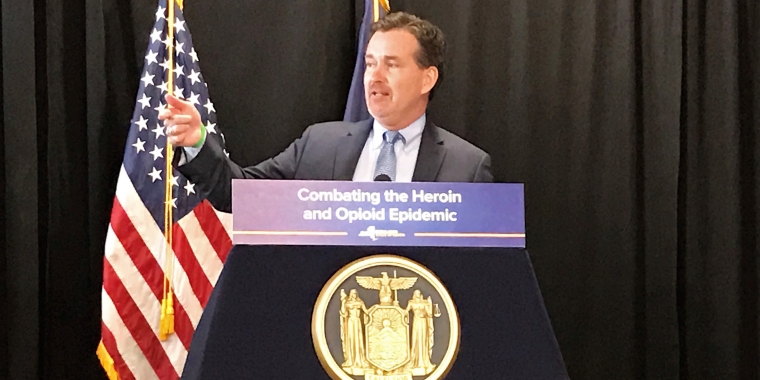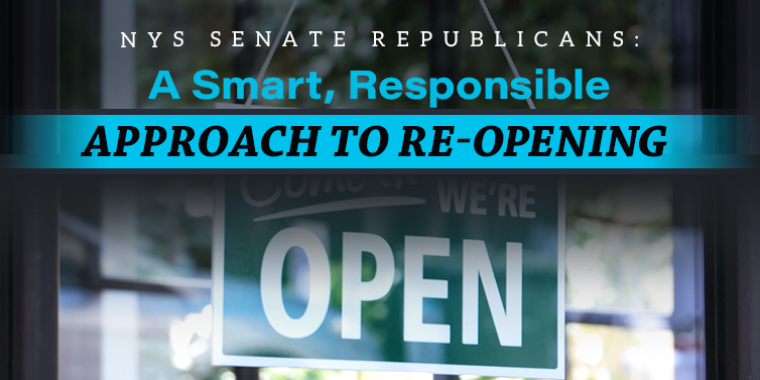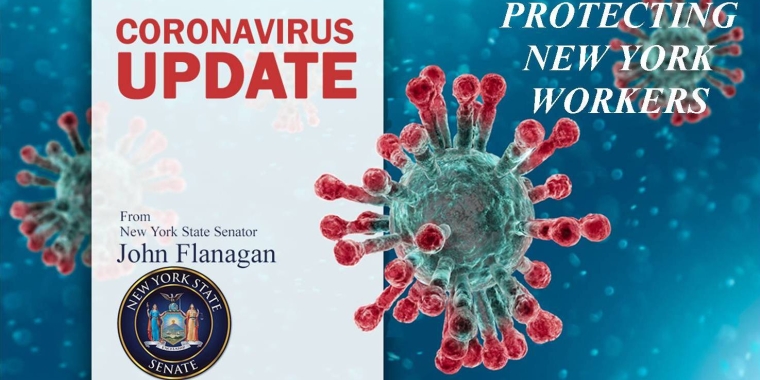
Senate Passes Bills That Continue The Fight Against Drug Abuse
April 24, 2017

The New York State Senate today continued legislative action on one of the chamber’s top priorities for the remaining session by passing eight bills tackling the heroin, opioid, and synthetic drug crisis. The measures address the evolving challenges presented by fentanyl and synthetic drugs, and also help increase coordination among health care personnel to prevent future opioid overdoses and abuse.
Senate Majority Leader John J. Flanagan said, “The Senate is at the forefront in taking legislative action to combat the state’s heroin crisis and was instrumental in securing $214 million in this year’s budget for measures to prevent and treat heroin and opioid abuse. When combined with the measures passed today and additional initiatives being pursued by our Task Force on Heroin and Opioid Addiction, we are enhancing the resources used by law enforcement and treatment professionals to address public health and safety.”
Six measures passed today target the increased use of synthetic and “designer” drug combinations that escape criminality through loopholes in existing laws, including:
- Bill S933, sponsored by Senator Thomas Croci (3rd Senate District), adds new derivatives of fentanyl to the controlled substance schedule and increases criminal penalties for the sale of an opiate containing a fentanyl derivative. Fentanyl is a strong pain medication that is often combined with anesthesia to prevent surgery-related pain. However, it is increasingly being mixed with heroin and other drugs to produce a cheaper and more lethal product.
Senator Croci said, “The heroin epidemic is devastating communities and families across the State of New York and especially in my home County of Suffolk. As if heroin on its own was not bad enough, we now have fentanyl and its derivatives in the mix taking an even deadlier toll. Changing the laws surrounding this deadly opioid synthetic could mean the difference between life and death to the countless people caught in the throes of addiction.”
- Bill S300, sponsored by Senator Terrence Murphy (40th Senate District), would designate Xylazine as a controlled substance due to recent instances of this veterinary drug being used to lace heroin. It has emerged as a new threat in the state's battle against the heroin epidemic because the heroin-Xylazine combination is so potent that it can take multiple doses of naloxone to revive an overdose victim, and even this regime is not guaranteed to be effective. Dealers are using this dangerous drug to “enhance” their products, but risks include a dangerous depression of the central nervous system, causing individuals to drift in and out of consciousness, as well as negatively affecting heart function.
Senator Murphy said, “The passage of this legislation is another strong step forward in our fight to end the heroin and opioid epidemic. When combined with heroin this Zombie Drug is so potent that it can take multiple doses of Narcan to revive an overdose victim. Adding it to the controlled substance schedule provides another mode of diversion to keep it out of the hands of addicts and off our streets.”
- Bill S816, sponsored by Senator Rich Funke (55th Senate District), designates Alpha-PVP, also known as “Flakka” or “Gravel” as a controlled substance. Similar to bath salts and methamphetamine, use of this designer drug has been known to cause violent behavior, with side effects including nausea, vomiting, paranoia, hallucinations, delusions, suicidal thoughts, seizures, chest pains, and increased blood pressure and heart rate.
Senator Funke said, “Like bath salts, Flakka is a dangerous synthetic drug that can trigger extreme hallucinations and violent behavior. With law enforcement experts sounding the alarm on Flakka availability in New York, it’s time to put the law in line with the threat to crack-down on Alpha-PVP before it’s too late.”
- Bill S3518, sponsored by Senator Flanagan, classifies synthetic marijuana like K2, Spike 99, Spice, Yucatan Fire, Genie, Zohai and many others, as Schedule I controlled substances. These legal herb-like products are laced with a synthetic cannabinoid to produce a high similar to existing controlled substances, but with more dangerous side effects, including hallucinations, vomiting, agitation, increased heart rate, elevated blood pressure and other adverse conditions. Not only does the bill provide for the imposition of criminal sanctions on synthetic pot, but also makes it a felony to sell such products to a minor or on school grounds. Further, these actions would criminalize possession of synthetic pot to deter use by law-abiding individuals who may otherwise be unaware of the harmful effects of these drugs.
- Bill S2722, sponsored by Senator Jeffrey Klein (34th Senate District) bans the analog substances of scheduled controlled substances. By expanding the state’s ability to ban analog substances, state drug and law enforcement agencies are given another tool to combat the quickly moving world of designer drugs that simply “tweak” an existing scheduled substance in order to avoid criminal prohibitions.
- Bill S658, sponsored by Senator Tim Kennedy (63rd Senate District), adds a new synthetic opiate, U-47700 and commonly referred to as "Pink" to the schedule I opiate list. This inexpensive drug has spread in popularity across the United States and is reportedly eight times more powerful than heroin.
Two measures passed today will help promote information sharing to prevent the abuse of prescription and other drugs, among other benefits of health care coordination. They include:
- Bill S2639, sponsored by Senator Andrew Lanza (24th Senate District), requires hospital and emergency room physicians to notify a patient's prescriber when a patient is being treated for a controlled substance overdose. The measure enhances the effectiveness of the Prescription Monitoring Program (PMP) Registry when prescribing controlled substances by ensuring that vital medical information is shared among health care practitioners. The bill requires an emergency room or hospital practitioner treating a patient with an opioid overdose to consult the PMP registry and notify the patient's prescriber of the overdose. Without such notification of the overdose, it is very possible that the prescriber/practitioner would not know that the patient had suffered an overdose of the opioid.
Senator Lanza said, “This bill is a common sense extension to the landmark I-STOP legislation which I authored in 2012 to establish New York’s prescription drug monitoring registry. The bill adds hospital and emergency room practitioners to those who are mandated by law to consult the registry, along with pharmacists and other doctors. Sharing this vital information amongst health care professionals allows for better evaluation and treatment of patients with regards to controlled substances.”
- Bill S2248, sponsored by Senator Kemp Hannon (6th Senate District), helps facilitate the exchange of health care information with hospitals, office-based surgery practices, and health care providers who accept walk-in patients not regularly seen by the provider. These practitioners would utilize and maintain an electronic health records system that connects to the local regional health information organization, aiding in the prevention of drug abuse by giving these clinics and urgent care centers the ability to see patient records and whether there is a history of drug use or prescriptions. Additionally, these clinics would add details of the visit to the patient’s records for any future medical treatment, thereby ensuring the patient receives appropriate care.
The bills have been sent to the Assembly.
Share this Article or Press Release
Newsroom
Go to Newsroom
Special Statement From Senate Republican Leader Flanagan
March 25, 2020

Statement From Senate Republican Conference Leader Flanagan
March 23, 2020

